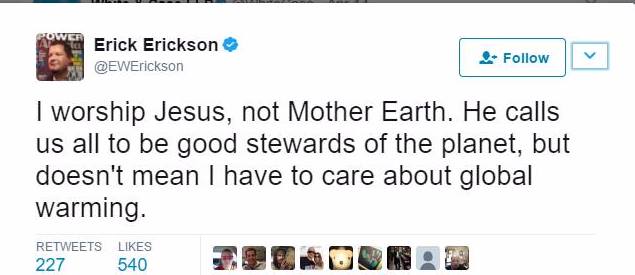Today, Donald Trump announced that the US is withdrawing from the Paris climate accord, an international agreement which seeks to set goals for reducing each country’s pollution and impact on climate change. Almost 200 countries have committed to the Paris accord. Every other major industrialized nation is part of it. What makes the US special? For the past four decades, our politics has been dominated by a bizarre electoral alliance that aligns the fossil fuel industry and conservative evangelical Christians who have made climate change denial one of the litmus tests of their orthodoxy.
Anyone reading the Bible without an American white evangelical filter would be flabbergasted that any Christian could justify being anti-environmentalist. Ecological stewardship is central to the teaching of the Hebrew scriptures. Ancient Israelites understood sin as poisonous to the land. Leviticus 18:28 says, ” If you defile the land, it will vomit you out as it vomited out the nations that were before you.” Though the ancient Israelites weren’t industrially capable of the same pollution that we have today, they recognized that sinful dispositions like arrogance, greed, lust, anger, envy, and gluttony destroyed not only human society but also the land they needed to survive. An economic system built upon accentuating and exploiting these sinful dispositions is not going to be compatible with a biblical worldview without heavy filtering.
The book of Job is God’s rebuke of the hubris of human civilization. Most people gloss over the speech with which God answers Job’s complaint. God is not telling Job he’s wrong to question God. He’s putting all of humanity in its proper place as one species among the millions that God loves dearly:
Who has cut a channel for the torrents of rain, and a way for the thunderbolt, to bring rain on a land where no one lives, on the desert, which is empty of human life, to satisfy the waste and desolate land, and to make the ground put forth grass?… Can you hunt the prey for the lion, or satisfy the appetite of the young lions, when they crouch in their dens, or lie in wait in their covert? Who provides for the raven its prey, when its young ones cry to God, and wander about for lack of food?… Do you know when the mountain goats give birth? Do you observe the calving of the deer? Can you number the months that they fulfill, and do you know the time when they give birth, when they crouch to give birth to their offspring, and are delivered of their young?
If God cares deeply about every creature he has made, why would Christians think we have a pass to destroy the environment? The tweet above from evangelical culture warrior Erick Erickson provides an important insight. Notice that he understands environmentalism as a question of whether one worships Jesus or “Mother Earth.” In other words, his political stance is a reaction against an imagined liberal new age spirituality. This is how toxic Christianity defines itself politically. Whatever the new age hippies and the secular humanists are for, we have to be against it. That’s how Jesus came to love guns and pollution as much as he hates science and premarital sex.
The other anti-environmentalist argument toxic Christianity makes is to turn it into a question of God’s sovereignty. According to Republican Congressman Tim Walberg, we shouldn’t worry about climate change because if it actually is a problem, God will take care of it:
I believe there’s climate change. I believe there’s been climate change since the beginning of time. I believe there are cycles. Do I think man has some impact? Yeah, of course. Can man change the entire universe? No. Why do I believe that? Well, as a Christian, I believe that there is a creator in God who is much bigger than us. And I’m confident that, if there’s a real problem, he can take care of it.
In this case, Congressman Walberg is defining his Christian faith in contradistinction to the secular humanists who don’t believe in God and thus worry about all sorts of things that God can take care of. To scorn responsible ecological stewardship on the basis of God’s sovereignty is analogous to the arrogance of a rich teenager who tells his friends not to worry about him driving after he guzzles a fifth of vodka because Daddy will pay for it if anything bad happens. It does not get more ironic than disrespecting God’s creation on the basis of his sovereignty. These same Christians claim that atheists have no moral foundation because they don’t have a God to keep them in line. But atheists don’t invoke the existence of God as a basis for their moral nihilism.
Let’s put this in really simple terms. In this phase of global capitalism, too many industries have a fundamental dishonesty built into how they operate. They do not incorporate the cost of cleaning up after themselves into their budgets. They’re like cooks who leave the kitchen sink full of filthy pots, expecting someone else to take care of them. Imagine being the mom in a household of people who never clean up after themselves. Maybe that’s what it’s like to be God.
In any case, there are rational conversations to be had about the pros and cons of various approaches to the environment. Maybe there are legitimate problems with specific aspects of the Paris Accords. But to bring God’s name into the conversation as a means to justify not having the conversation is irresponsible, blasphemous, and toxic for our planet.
Check out my book How Jesus Saves the World From Us: 12 Antidotes to Toxic Christianity!
Subscribe to our podcast Crackers and Grape Juice!
Support our campus ministry NOLA Wesley as a monthly patron or one-time donor!













